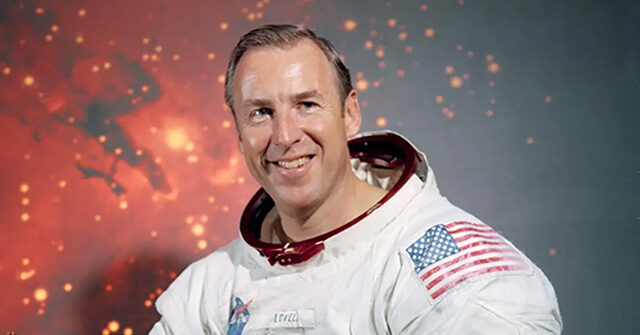James A. Lovell, also known as “Jim,” who served as the Mission Commander for the Apollo 13 mission to the moon, has died. He was 97.
In a press release from NASA, it was revealed that Lovell passed away on Thursday, August 7, in Lake Forest, Illinois. Acting NASA Administrator Sean Duffy expressed that Lovell’s “character and steadfast courage helped” the United States reach the Moon and had helped to turn a “potential tragedy into a success.”
“NASA sends its condolences to the family of Capt. Jim Lovell, whose life and work inspired millions of people across the decades,” Duffy said in a statement. “Jim’s character and steadfast courage helped our nation reach the Moon and turned a potential tragedy into a success from which we learned an enormous amount. We mourn his passing even as we celebrate his achievements.”
“From a pair of pioneering Gemini missions to the successes of Apollo, Jim helped our nation forge a historic path in space that carries us forward to upcoming Artemis missions to the Moon and beyond,” Duffy added. Duffy continued to highlight how “as the Command Module Pilot for Apollo 8,” Lovell and his crewmates “became the first to lift off on a Saturn V rocket and orbit the Moon.”
“As the commander of the Apollo 13 mission, his calm strength under pressure helped returned the crew safely to Earth and demonstrated the quick thinking and innovation that informed future NASA missions,” Duffy added.
Lovell, who was born in Cleveland, Ohio, on March 25, 1928, was “selected to join NASA in 1962 as part of the agency’s second round of astronauts,” according to NBC News. While Lovell took part in several missions, such as Gemini VII, Gemini XII, and the Apollo 8 mission, his Apollo 13 mission “brought him the most fame” after “one of the spacecraft’s oxygen tanks exploded” after 55 hours, 55 minutes, and four seconds into the journey.
Lovell was selected to join NASA in 1962 as part of the agency’s second round of astronauts — a group that included Neil Armstrong, Charles “Pete” Conrad, John Young and others that were nicknamed the “Next Nine.”
Lovell’s first two spaceflights, Gemini VII and Gemini XII, were designed to demonstrate how humans could live in weightlessness and to test rendezvous and docking technologies that would be essential for subsequent space station operations.
Lovell next circled the moon on the Apollo 8 mission in 1968, but it was his fourth and final spaceflight that brought him the most fame.
According to NASA, the Apollo 13 mission “got off to an auspicious start” after the Saturn V “experienced an early shutdown of one of the second stage’s J-2 engines”:
The mission got off to an auspicious start when, during launch, the Saturn V experienced an early shutdown of one of the second stage’s J-2 engines. Burning the remaining four engines an additional 34 seconds longer and the third stage an additional nine seconds placed Apollo 13 in the proper orbit. Afterwards, the mission settled into what increasingly felt like a routine journey prompting Joe Kerwin, the capsule communicator back in Houston, to proclaim that the “spacecraft is in good shape” and that he and everyone else in the control room were “bored to tears down here.” Minutes later, the explosion of oxygen tank number two ended those feelings of boredom entirely.”
As warning lights in the cabin indicated the loss of two of the three fuel cells, the crew communicated to Houston that indeed they had a big problem. Looking to the outside of the command module Odyssey, Lovell noticed they were “venting something out into the…into space.” That venting was in fact the lifeblood of the mission, oxygen. The crew discovered that the explosion in tank number two had also damaged tank number one—a problem which made use of the fuel cells impossible threatening the eventual loss of all electrical power and water. With the lunar landing now erased from the equation, both the astronauts aboard Apollo 13 and NASA personnel on the ground worked tirelessly around the clock to develop solutions that would allow them to return home safely.
After spending several days in space, and “taking a free-return-to-Earth trajectory and using the Sun as an alignment star for navigation,” the astronauts from the Apollo 13 mission splashed down in the Pacific Ocean on April 17, 1970.
Lovell’s family issued a statement expressing that they were “enormously proud of his amazing life and career accomplishments,” adding that they would “miss his unshakeable optimism” and his sense of humor.
















